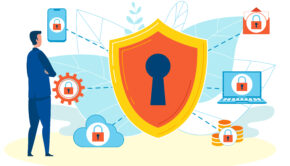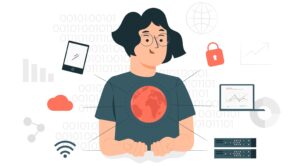Tech Crackdown: Increasing Privacy Concern & Solutions For Millennials
Millennials are the largest generation group right now. Born between 1981 and 1996, millennials are likely to be a major part of the population and run the world for the next few decades.
Research shows that most millennials have a smartphone, and over 90% of them use it as the primary mode of communication. In fact, they are so addicted to their smartphones, they are more likely to let a friend borrow their car for 24 hours but not their smartphone for 10 minutes.
As the number of these smartphone users is rising, there’s an increasing concern among the industry leaders.
Due to the wide availability of smartphones and cheaper data, more and more people are jumping into the digital world and sharing their data.
But how safe is that data?
What’s The Threat?
You love clicking photos on your phone, play games, watch movies, or text someone.
But have you ever wondered if anyone’s watching you?
As creepy as it sounds, big tech companies like Facebook and Google are often accused of spying on their users and collect personal data to make their algorithm better.
While you may think, “what’s the big deal?”
You don’t see the bigger picture. When these big tech companies collect personal data, they start to build a virtual model. With every bit of data, they build your profile that can be used later.
And these are not just random profiles. It contains every bit of your data, even things you might not even be aware of.
How Big Is The Threat?
Do you remember the Facebook–Cambridge Analytica data scandal?
It was alleged that Facebook was collecting the personal data of millions of Facebook users without their consent using consulting firm Cambridge Analytica, predominantly to be used for political advertising.
In other words, your own data was over to change your thoughts on politics and the election itself.
Had the scandal not been discovered, it could have overturned any election anywhere, changed governments, and whatnot!
And it’s not just Facebook and Google that’s doing this. There are many shady apps on the web that slips through your phone’s security layers and steal your personal data.
What Are Millennials Thinking?
Over 90% of millennials fear losing their personal data but at the same time, they are addicted to the one thing that’s harming them the most.
Smartphones are so closely associated with their lives that they consider them to be an extension of their own body.
What Millennials Are Doing?
Due to more and more awareness, millennials have started to understand the importance of privacy and security of their personal data.
Because once personal data is leaked, it’s not about the names, usernames, and passwords of Facebook and Instagram. Millennials are twice as likely to have an online bank account and be signed in on their smartphones.
If their data isn’t secured, the same financial data can be stolen and be misused for illegal activities.
And not just financial data, most millennials also have their identity proof downloaded on their mobile devices. Any data leak might even cause identity theft.
Are They Serious?
Thanks to the awareness, millennials have started to take precautions to safeguard their online data. To save themselves from theft, they have started to add additional security layers like 2FA.
While having two-factor authentication (2FA) enabled is a good solution to add an extra layer of security, it might not be enough if an app already has access to the data.
Hence, an increasing number of millennials have also started to quit Facebook and Instagram addiction to detox their life from digitalization. Others have started to either opt-out or limit their online banking.
What’s The Solution?
While it is an option to quit Facebook and Google, in today’s digital world, we cannot live without using the internet.
However, we can limit their use so that they cannot collect more data. Additionally, we should only be downloading apps from trusted sources like the Play Store or App Store. Even if it is in these stores, we should first verify the app whether is a legitimate one before installing it.
Secondly, we should be cautious while entering our financial data while buying an online product. It is recommended to buy only from trusted, popular vendors that have proper security measures to protect your digital assets.
Privacy is an ever-evolving concern, stay updated with all the happenings around the world.
Cover Image By PixBay
















